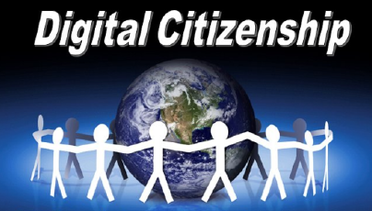In this lesson, you will learn to recognize the elements of digital citizenship:
- Digital Etiquette
- Digital Communication
- Digital Literacy
- Digital Access
- Digital Commerce
- Digital Rights and Responsibilities
- Digital Law
- Digital Health and Wellness
- Digital Security
Who is a digital citizen?
You!
Basically, a digital citizen is anyone who uses digital tools such as computers, cell phones, or the internet in their work, school or for recreation. Just like citizens of a city have to adopt rules and standards of behavior in order to live together, those of us in the digital world should do the same.
There are general guidelines we can all follow in order to stay safe, and work well in the digital world. These guidelines are outlined in the elements of digital citizenship.
What are the 9 elements of digital citizenship?
The elements of Digital Citizenship, defined by Mike Ribble and Gerald Bailey are as follows:
Digital Access
- Making sure that all students have equal access to digital tools like laptops, digital cameras and the Internet
- Providing time and equipment for students with special needs
- Making students aware of locations and resources you can use off campus
- Using computers to buy and sell items on commercial websites and auction sites
- Subscribing and purchasing media using tools like iTunes
- Exchanging information using:
- cell phones
- instant messaging
- text messaging
- web pages/blogs/wikis
- Learning about the basics of using a computer
- Evaluating online resources to make sure they are truthful and accurate
- Learning how to find information on a specific topic on the Internet
- Using technology in a way that doesn't affect others negatively
- Using technology only when it is appropriate
- Respecting others online by not posting information that is hurtful or untrue.
- Understanding how to use and share music, photos, and movies legally
- Creating original works that are free from plagiarism
- Respecting the privacy of others and the integrity of networks in terms of passwords and data
- Following Acceptable Use Policies
- Using technology responsibly
- Reporting inappropriate use of technology resources
- Using proper hand placement and posture when keyboarding
- Balancing time spent using digital tools with time spent offline
- Protecting hardware and network security by using secure and secret passwords
- Protecting personal security by not posting personal information online
Source: http://www.pensacolachs.org/webpages/capplications/index.cfm?subpage=428866

 RSS Feed
RSS Feed